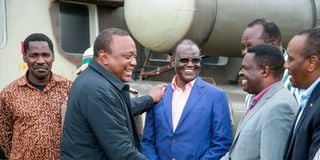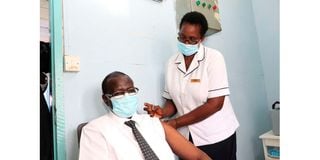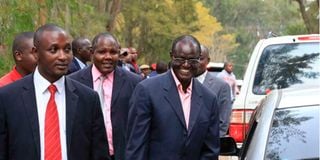Kiraitu Murungi: I’ll go slow on politics after encounter with Covid-19

President Uhuru Kenyatta is welcomed to Meru County by politicians led by Governor Kiraitu Murungi.
What you need to know:
- I had always worn a KN95 mask in all my public gatherings. I had taken Covid-19 tests thrice, and they had all turned negative. I had no usual Covid-19 symptoms. No cough, no sneezing, no fever. I felt relatively safe.
I had interacted with Covid-19 at a distance, as we continually advised the people of Meru to wear masks, wash hands, avoid shaking hands and keep social distances.
I had followed Health Cabinet Secretary Mutahi Kagwe and other ministry officials every day in the media giving statistics of those tested, those who had turned positive, those being treated in hospitals, those under home care, and those who had died.
I had always worn a KN95 mask in all my public gatherings. I had taken Covid-19 tests thrice, and they had all turned negative. I had no usual Covid-19 symptoms. No cough, no sneezing, no fever. I felt relatively safe. Little did I know that I would soon be part of those statistics.
My encounter with coronavirus was most unexpected. It was a most frightening experience. Coronavirus was no-longer merely an issue of statistics and emotional debates. It was now about me, and whether I would live or die. My entire life, my family, my work, and my future were suddenly at stake.
My coronavirus cycle was in three phases. The first phase was marked by denial. I had mentally refused to accept that I was sick. I forced myself to work until I couldn’t work anymore. I had extreme fatigue, fever, confusion and general weakness of the body, but I didn’t think it was Covid-19. For over one week, I tried to survive on over-the-counter medicine such as Panadol, Claritin and Augmentin. I proceeded with my normal action-packed days, albeit with a lot of difficulty. I continued to feel feverish and extremely tired, and suffered a sore-throat, headaches and confusion.

Meru Governor Kiraitu Murungi is vaccinated against Covid-19 at the Meru Teaching and Referral Hospital on March 8, 2021.
I did not have the usual Covid-19 symptoms like coughing or sneezing, but I was feeling extremely tired, had a severe back-ache, indigestion and a bloated stomach. To put it in layman’s language, I was not really myself. I just pushed and forced my body to work.
On Tuesday, March 9, I took the AstraZeneca vaccine. Although I was not feeling very well, I had to convince the people of Meru that the vaccine was safe. It was my duty as a leader to give our people confidence in the vaccine. I had been told that the side effects of the jab were high temperature, fever and a slight headache, which would disappear in a day or two. I experienced fever, headache, and very high temperatures that night. I thought they would disappear the following day but they didn’t.
The side-effects did not go away. Extreme fatigue, headaches, sore throat, and confusion of the mind persisted unabated. My self-prescribed antibiotics, Claritin and Panadol, didn’t work either. I was in a lot of pain and suffering. Deep inside me, I was still convinced that all this was the continued side effects of the AstraZeneca vaccine, which would go away.
On Saturday, March 13, I stayed indoors at my home at Nkubu, feeling feverish, weak and generally confused. My wife came and we travelled to Nairobi the following day. Our children had prepared an exciting surprise birthday for my wife, Priscilla, who was turning 60.I had great difficulty “surviving” the party. I was feeling extremely fatigued and drowsy. I had to insist on the cake being cut prematurely, so that I could go and rest in my bedroom.
On Monday, March 15, I saw a doctor who ordered several tests on me, including a Covid-19 test. The Covid-19 test was negative but the fever, fatigue and high temperatures persisted. At 3am Priscilla had to rush me to Aga Khan Hospital because my temperature had shot up to 39 degrees Celsius. Hospital tests found nothing. Surprisingly, the temperature was normal, at 37. So we returned home.
On Tuesday, March 16, my brother Dr Kiraitu came to see me at home and found me in a terrible state. I was drowsy and always felt like being left alone to sleep. He called Dr Mwongera and arranged for me to be admitted to Nairobi Hospital the same day.
At the hospital, I took numerous tests, including a malaria antigen test, blood culture, stool and urine, an ultra-sound, head and lungs CT scan, and of course Covid-19. The results came out the following day, I had Covid-19 pneumonia.
The second phase in my coronavirus cycle was acceptance and treatment. The doctors gave me hope but I could see they were not definite. They were trying their best. This was a scientific and medical phase involving consultants, doctors, nurses, and the medicines they prescribed. I had no real fight against coronavirus. I became fatalistic, ready for any outcome.
I was taken through a very strict regimen of treatment and drugs like Vitamin D360k, Zinc Remdesivir, Parafusiv, Ivermectin, Dexamethasone, Chlorhexidine, Xarelto, and Novarapid. The nurses kept a round-the- clock vigil. They kept monitoring my oxygen uptake, temperature, blood sugar, and blood pressure every two hours for six days.
For me at this point, nothing really mattered. Corona had disconnected me from everything. It put me out of action. I felt weak and useless. The news of Tanzania’s President John Magufuli’s funeral ceremonies on TV only reminded me of the possibility of my own death; my final exit from this world.
Magufuli had a great send-off. How would my exit be? I kept asking myself. Is this my final un-ceremonial exit from the world? I kept praying that I don’t die, until 2022 when I will be 70. At least I would have attained the optimum Biblical age.
My phone was full of email, SMS and WhatsApp get-well messages from family, friends, workmates, political colleagues, and even from my political opponents. Coronavirus had brought us together. When you fall sick or you die, suddenly you become everyone’s friend.
A few Facebook posts said I was in the Intensive Care Unit, and some said I was dead. It didn’t matter since I was alive. I got to read most of the goodwill messages after I was discharged.
I was informed by my staff that the churches and clergy in Meru had held prayers for me. One message read that God would restore my health and heal my wounds and I would go out “leaping like calves released from the stall”.
Their prayers were answered on Monday, March 22, when I was discharged, to continue my treatment at home, but I was not yet out of the woods. The test still showed I was Covid-19 positive, but I was not in any pain.
I owe my life to God, Dr Mwongera, my brother Dr Miriti, Dr Silverstein and team of doctors and nurses who performed the scientific miracle. I have heard some people being congratulated for winning a “heroic battle” against Covid-19. This is a self-delusion, I did nothing. I didn’t fight. At the hospital I just followed the doctors’ and nurses’ orders. I didn’t even know what they were giving me. I was too weak and subdued. It was a very humbling experience for me. If I died, that would be it. Everything would be irrelevant to me. You cannot defeat death. Even Lazarus who was raised from the dead, eventually died again.
The third coronavirus cycle was more friendly. It was in home isolation because I was still positive. I continued with treatment and convalescence. I was put under a home-care nurse who continued to administer my drugs and monitor my oxygen, blood pressure and blood-sugar levels every three hours. I found it difficult to sleep on my tummy with oxygen tubes in my nostrils, but after a week I got used to it.
The beautiful thing about this phase is that the pain, fatigue, fever and confusion were gone. Apart from confinement at home, and the frequent interruption by the nurse, life was almost normal.
Coronavirus should not only be seen in negative terms. It turned out to be one of the best, and most fulfilling times of my life. I enjoyed a “Corona Holiday”. For the first time in many years, I found myself all alone, reflecting about my life and my future. I enjoyed the warmth, love and friendship of my wife Priscilla, my children, and my close family members, without any external interferences. I also had time to read, watch TV, and follow politics on social media, like other ordinary Kenyans. I took time to take stock of my political life and to tidy up some loose ends in my thinking.
This phase of coronavirus turned out to be one of the most creative, inspirational and revelatory moments of my life. I read some interesting materials on history and philosophy. I read a booklet by a Roman philosopher, Seneca, On the Shortness of Life, which argued that our lives are not short; we only waste them with irrelevant things.
He showed how we allow our lives to be “stolen” by others, and how, gripped by insatiable greed for money and power, we dedicate our lives to useless tasks. He showed how political leaders are worn out by political ambitions, self-imposed servitude, and a life of display. He said our lives are “caught in the whirlwinds and storms, carried hither and hither, and driven round and round in circles by the rage of opposing winds”. This is very true of my life. My life had been ‘stolen’ from me by politics and social pressures.
As I read this book, I watched with pity a frail Raila Odinga, who was being treated for a Covid-19 attack, being literally “dragged out of bed” so that he and the President could be seen together opening roads in Nairobi and Kajiado — for political optics, to show Kenyans that the “Handshake deal” between the two was still intact.
Raila’s health came second. Politics came first. His life had been ‘stolen’ from him. He was living a life of display. He was caught up in the endless winds and storms of politics.

Meru Governor Kiraitu Murungi leaves Sagana State Lodge after a Mt Kenya leaders' meeting with President Uhuru Kenyatta on Septebember 15, 2017.
This was clear demonstration of how politics has robbed politicians of their lives. Our lives are no longer our own. We have been estranged and alienated even from ourselves. We are permanently on stage, making impressions, seeking to be liked and approved by others. We live a life of endless pretences. We are too psychologically terrified to think and act independently.
I felt sad we have lost our own authenticity and freedom. Even our thoughts and our voices are no-longer truly our own. We live a life of fear and suspense, always worried about what others will think or say about us. We are constantly listening to rumours and scanning the political weather so that we can always be politically correct and always be on the winning side.
The coronavirus break gave me an opportunity to take stock of my own personal political journey. Politics had robbed me of my life and my voice. Sometimes, it had robbed me of my freedom of thought. I had become obsessed with winning. In doing so, I had advocated and fought for ideas and anxieties which were not genuinely my own. I had given in too much to political and social expectations of others.
Had I died of coronavirus, I would have died alone. All that noise and bustle of politics would continue without me.
I made a decision to appreciate myself and to reclaim my life. From now on, I would follow the desires of my heart. I would ignore all the noise, the psychological burdens of friendship and idiocies of politics. I, too, have a fundamental duty to live a happy and decent life in the remaining years of my life.
I promised myself to pursue my dreams without seeking approval from anybody. I thank coronavirus for helping me to find myself, and to liberate me from ‘others’.
Kiraitu Murungi, LLB (Hons) LLM(NB) LLM (Harvard), is an advocate of the High Court of Kenya, and the Governor of Meru County.





